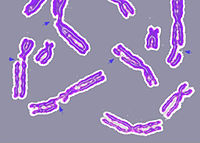
Photo from wikipedia
Background: While additional gastrectomy has not shown superiority compared to conventional systemic therapy in unresectable gastric cancer in REGATTA trial, there have been several subsequent attempts to find a role… Click to show full abstract
Background: While additional gastrectomy has not shown superiority compared to conventional systemic therapy in unresectable gastric cancer in REGATTA trial, there have been several subsequent attempts to find a role for conversion surgery with a curative intent in selected patients. The aim of this study was to analyze the conversion surgery data and to see if there was a role of cancer dormancy markers to select patients for conversion surgery. Patients and Methods: From the pathology database at Seoul National University Bundang Hospital, we identified 49 patients treated with chemotherapy followed by gastrectomy in initially unresectable gastric cancer from January 2006 to August 2016. Of these, 26 patients were analyzed to explore the role of conversion surgery with a curative intent. As cancer dormancy markers, NR2F1, nanog, mig6, and pERK were evaluated using immunohistochemistry staining. Results: Twenty-six (53%) from a total of forty-nine patients received conversion surgery. The median age was 58 years (range, 39-78) and the duration of prior chemotherapy before conversion surgery was 5.1 months (range, 3.1-13.9). Category 2 with para-aortic lymph node involvement was the most prevalent disease status (57.5%). At the time of conversion surgery, complete response, partial response, and stable disease status had been established with chemotherapy in 2, 15, and 3 patients, respectively. Of these, R0 resection was accomplished in twenty-two (85%) patients. Median overall survival (OS) in all patients that underwent conversion surgery, defined as the time from initiation of chemotherapy to death by any cause, was 36.1 months (95% CI, 29.6-51.4). In patients that underwent R0 resection, disease free survival (DFS) from conversion surgery and OS from initial chemotherapy was 15.1 months (95% CI, 13.9-43.8) and 37.8 months (95% CI, 31.7-57.1), respectively. Patients with a shorter duration of prior chemotherapy were associated with both longer OS and DFS from conversion surgery (p Conclusion: When advanced gastric cancer showed a favorable response after chemotherapy, a survival of over 3 years was observed in patients who received a curative conversion surgery, despite the initial unresectability. We may expect survival benefits from conversion surgery in certain subgroups, with better initial response to palliative chemotherapy and higher levels of specific cancer dormancy proteins in the tumor. Citation Format: Hun Jee Choe, Jin Won Kim, Song-Hee Han, Kui-Jin Kim, Jeong-Min Kim, Koung Jin Suh, Ji-Won Kim, Keun-Wook Lee, Hye Seung Lee. Conversion surgery in unresectable advanced gastric cancer and cancer dormancy as a prognostic marker [abstract]. In: Proceedings of the American Association for Cancer Research Annual Meeting 2019; 2019 Mar 29-Apr 3; Atlanta, GA. Philadelphia (PA): AACR; Cancer Res 2019;79(13 Suppl):Abstract nr 3750.
Journal Title: Tumor Biology
Year Published: 2019
Link to full text (if available)
Share on Social Media: Sign Up to like & get
recommendations!